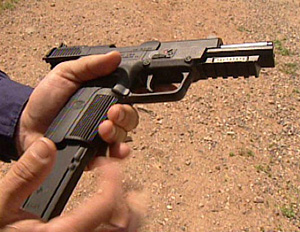
|
 |
 |
 Americas & Beyond | June 2008 Americas & Beyond | June 2008  
Mexican Cartel Hit List Targets Americans, Police Say
 Alicia A. Caldwell - Associated Press Alicia A. Caldwell - Associated Press
go to original


| | The Belgian-made FN 5.7 pistol is in high demand by drug cartel assassins in Mexico. The gun is nicknamed the "mata policia," or cop killer, in Mexico because it fires a round that can penetrate police body armor. (ABC News) | | |
El Paso - More than dozen people living in New Mexico and Texas are named in what appears to be a hit list from a Mexican drug cartel, law enforcement officials said.

At least one police officer from southern New Mexico is among the 15 to 20 people named in the threat, said Arturo Baeza, a sheriff's captain in that state's Luna County.

The list, thought to be a threat from one of Mexico's powerful and warring drug cartels, was provided June 12 to local authorities by U.S. Immigration and Customs Enforcement officials, Baeza said.

Drug cartels are waging a bloody fight for control in Ciudad Juarez, a sprawling city across the Rio Grande from El Paso, and Palomas, a village across the border from Columbus, N.M. More than a dozen police officers were among more than 400 people killed in Ciudad Juarez this year.

Hit lists naming Mexican police officers have become somewhat common in the cartel fight.

"We have been concerned for quite some time that this thing will spill over here," Baeza said.

The list included threats against people living in southern New Mexico and Albuquerque, as well as current and former residents of El Paso, Baeza said. His office has been told federal officials were contacting the people on the list, he said, but he would not identify any of them.

Luna County Sheriff Raymond Cobos also confirmed the existence of the list in an interview with the Las Cruces Sun-News.

Leticia Zamarripa, an ICE spokeswoman in El Paso, said she could not comment on Baeza's report of the hit list.

Officer Chris Mears, an El Paso Police Department spokesman, said his agency had "no credible information suggesting that violence in Ciudad Juarez will spread into El Paso." | 
 | |
 |



